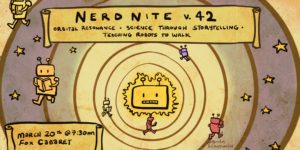Happy Nowruz! It is a new day. a day that if you were Persian you would be celebrating a new year. It’s a special day for many reasons, the Earth has tilted back towards the sun, and has hit equilibrium. Things are springing anew around us, it’s a time to get things growing in our lives, which for us here at Nerd Nite, means learning together. So no matter how you celebrate this day, let’s celebrate it together, because after all this is the 42nd edition of Nerd Nite so let’s seek the “The Answer to the Great Question… Of Life, the Universe and Everything”.
Poster by: Armin Mortazavi IG: @armin_mortazavi
Where: The Fox Cabaret
When: Wednesday March 2oth; Doors @ 7, show starts @ 7:30
Tickets: Eventbrite
1. Orbital Resonance
Christa Van Laerhoven
We generally think of planets (and the smaller stuff, too) as going about their orbits, minding their own business. In actuality, our Solar System is a giant interact-a-thon, as fellow planetary bodies perturb each other via gravity. I will talk about a kind of interaction called orbital resonance and a way to diagnose that this particular kind of interaction is happening. The cast celestial characters that will help me demonstrate these concepts includes Neptune and everyone’s favourite not-a-planet Pluto.
Bio: Christa Van Laerhoven is a valley girl from Agassiz and a postdoctoral fellow at UBC, studying what she likes to call ‘orbital shenanigans’ (how the orbits of planets, asteroids, and moons can change over time). She has a PhD from the Department of Planetary Sciences, University of Arizona and a B.Sc. from UBC in Physics and Astronomy (Honours).
2. Science Through Storytelling
Kristi Charish
Ask any gamer who’s played the sci-fi video game series Mass Effect about the genophage and they will spin you a tale of a genetically engineered virus that devastates an entire species’ fertility, and then they’ll tell you of the mission they’re on to discover and distribute a cure. So if a video game can convince millions of gamers to engineer a vaccine and release it across the galaxy, why can’t we convince people on earth to vaccinate against measles and take their antibiotics? Are we speaking a different language? Living in an overlapping but parallel universe? Tonight we’ll talk about the power of the narrative and why it works so well. Video games, TV procedurals, films, and even our arch nemesis pseudoscience use the power of the narrative and we can too!
Bio: Kristi is the author of OWL AND THE JAPANESE CIRCUS, an urban fantasy series about a modern-day “Indiana Jane” who reluctantly navigates the hidden supernatural world, and THE VOODOO KILLINGS, an urban fantasy/mystery about a voodoo practitioner living in Seattle with the ghost of a deceased grunge rocker. She writes what she loves; adventure heavy stories featuring strong, savvy female protagonists, pop culture, and the occasional RPG fantasy game thrown in the mix.
Kristi is also a scientist with a BSc and MSc from Simon Fraser University in Molecular Biology and Biochemistry and a PhD in Zoology from the University of British Columbia. Her specialties are genetics, cell biology, and molecular biology, all of which she draws upon in her writing.
Twitter: @kristicharish
FB: http://www.facebook.com/KristiCharishAuthor
Website: http://www.kristicharish.com
Instagram: @charishkristi
